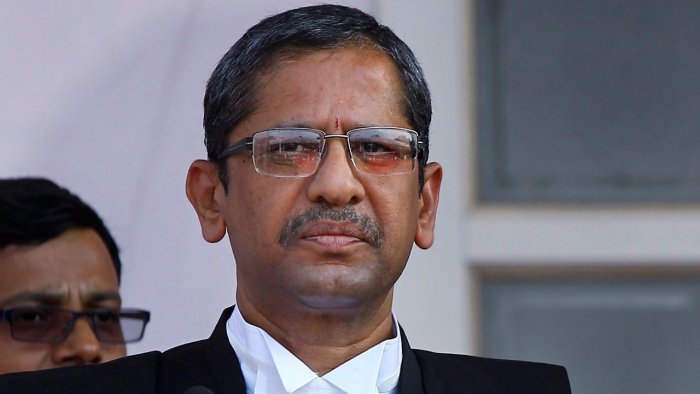Chief Justice of India NV Ramana’s pronouncements November 22 on the rulers’ duty should inspire confidence among the people in the rule of law. It could also restore faith in the judiciary which has considerably been eroded during the past few years when justice was often not “seen to be done” as it should be. The dictum is clear that it is not enough to do justice, but the judiciary needs to ensure that people can see justice being done. It has, unfortunately, not been the case in several recent instances when many supporters and leaders of the ruling BJP boasted the judiciary would do only what they wish. There is a well founded impression that, in several major cases, the Supreme Court gave judgements to suit the interests of the ruling elite. The rulings have been glaringly pro-government. In the case of demolition of the Babri Masjid, a Bench led by the Chief Justice of that time had no solid evidence served up to prove that the mosque had been built by destroying a temple nearly five centuries ago, but the verdict was in favour of building a temple at the site that sent certain rabid elements into raptures, making a mockery of justice. It virtually meant the guilty got rewarded for their crime of destroying not only a relic of history but also of damaging the country’s delicate social fabric. The worst outcome of this apparent blurring of the borderlines between the judiciary and the executive is that the main author of this judgement, Chief Justice of that time, was shortly thereafter nominated to the Rajya Sabha by the ruling party.
However, since the new CJI assumed office, winds of change seem to be blowing and pronouncements by the judiciary in major cases are steadily restoring the people’s confidence about fair play. CJI Ramana recently spoke about how rulers need to introspect every day about whether the decisions taken by them are good and also check if they have any bad characteristics, clearly pointing to some events of the near past. It could not have come at a more opportune time. For, the country has just seen how a nearly year-long agitation by thousands of farmers against the three controversial farm laws forced the government to introspect whether its decision riding roughshod over the feelings of farmers was good and find out its ‘bad characteristics,’ as the CJI said. Of course, the government is still obdurate not to find fault with its decision and Prime Minister Narendra Modi merely said the government could not explain the merits of the laws to the farmers. It means the government had to bow to the wishes of the farmers not because it thought its legislations had ‘bad characteristics,’ but because it is scared of the electoral repercussions they may have in the next few months when several states, including UP, Punjab and Uttarakhand go to the polls. This was rather projected as a ‘tapasya’ gone wrong.
One of the factors that could have compelled the government to accept defeat at the hands of the farmers was the intervention of the apex court which suspended the implementation of the three laws January 12 and appointed a committee to understand the pros and cons of the laws. The farmers waged a do or die battle against what they felt colossal harm being done by the government to their livelihood. The judicial action did keep alive hope as the CJI averred the court would decide on the merits and demerits of the three laws. Apart from the votes, it may be that the government could sense this time around the judiciary would not be as pliant as it had been in the recent past when judges like Gogoi and Bobde headed it.
In such a backdrop, CJI Ramana struck the right note when he said at a programme in Puttaparthi town in Anantapuramu district of Andhra Pradesh: “There is need to offer just administration and it should be according to people’s needs.” He also reminded the audience of the “developments that are taking place worldwide and countrywide.” The reference is unmistakable. Nothing can be more reassuring than the CJI’s words that it was his desire that all the systems in the country should be independent and honest, solely aiming to serve the people.
Earlier also, CJI Ramana had pulled the government up for the way the sedition law is being used by the government to crush liberties. He asked Attorney General KK Venugopal and Solicitor General Tushar Mehta, appearing for the Centre, why a colonial law used against Mahatma Gandhi and Bal Gangadhar Tilak continued to survive in the law book after 75 years of Independence. “Sedition is a colonial law. It suppresses freedoms,” he observed. The CJI’s oral statement in open court resonated well at a time when public anger is rising against Central and State law enforcement agencies using the sedition law to silence dissent, muffle free expression and for denying bail to incarcerated journalists, students and other activists. A number of petitions have been filed highlighting the chilling effect the law on sedition has on the fundamental right of free speech. The apex court was right to point out to the government’s two top law officers why the sedition law is not being annulled as governments of all hues have been using it to settle scores with their critics.
The agitating farmers have kindled hope that a government with overwhelming parliamentary majority can be brought to its knees by the people, who send their representatives to the parliament, if they act against their wishes. Now, the apex court under the leadership of the incumbent CJI is slowly and steadily renewing the faith of the people that the judiciary can be relied upon in strengthening the people’s cause and thereby the very essence of democracy.
